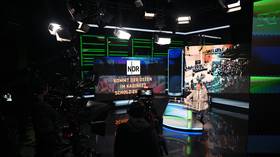EU regulators’ case against RT DE unfair: Here’s why

The EU media regulator’s representative promised to “take care of” RT DE, amid claims that the channel has no right to broadcast in Germany.
The media authority of Berlin-Brandenburg (MABB) has pressed charges against RT DE, arguing it is a broadcaster based in Berlin and therefore subject to their authority.
This happened shortly after European Regulators Group for Audiovisual Media Services (ERGA) chair Tobias Schmid called RT DE a “nuisance” that needs to be “taken care of.”
Where is RT DE based?
While some RT DE content is created at a newsroom in Berlin, the actual headquarters of the channel are in Moscow, where all the editorial decisions are made. The Berlin newsroom produces some of the shows, but it does not broadcast – so it cannot be sued as a broadcaster.
How does RT DE broadcast?
The channel broadcasts German-language programming via satellite, with a signal originating in Serbia. RT DE received a broadcasting license in Serbia on December 6, 2021, which is valid through 2029.
RT previously applied for a broadcast license in Luxembourg as ‘RT auf Deutsch’, but was denied in August 2021. While multiple German media outlets reported that then-Chancellor Angela Merkel influenced Luxembourg’s decision, she officially denied this.
How is broadcasting from Serbia legal?
While Serbia is not a member of the EU, both Belgrade and Berlin are signatories of the European Convention of Transfrontier Television (ECTT). Germany ratified the treaty in 1991, while Serbia has been a party to it since 2010.
Article 4 of the ECTT says the parties “shall guarantee freedom of reception and shall not restrict the retransmission on their territories of programme services which comply with the terms of this Convention.”
Why not apply for a German license?
German media law prohibits political parties or judicial persons governed by public law – except for churches and universities – to operate broadcasting services. This ban also applies for companies in which a state is a majority shareholder.
As RT is a public nonprofit Russia considers an “organization of strategic importance,” Germany considers it state-owned TV, and has therefore ruled out giving RT DE a license. This is why RT filed first in Luxembourg, then in Serbia.
Ongoing pressure on RT
Friday’s lawsuit is only the latest in a series of moves by German authorities to restrict RT’s German-language programming. Earlier this year, Germany’s Commerzbank suddenly closed the account of the production company affiliated with RT Germany, without an explanation, and multiple other banks ignored inquiries about opening an account.
In September, YouTube deleted RT DE’s account – as well as a secondary account – citing alleged violations of ‘community guidelines’ in the coverage of German protests against Covid-19 restrictions. The ban followed a series of negative and even outright defamatory articles about RT in German media.
On Thursday, the Google-owned platform deleted the RT auf Sendung (RT On Air) channel, calling it an attempt to circumvent the earlier ban. German regulators are now pointing to these bans to challenge RT DE’s legitimacy.















